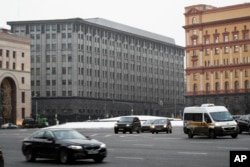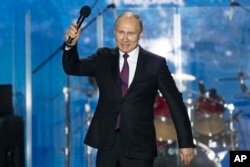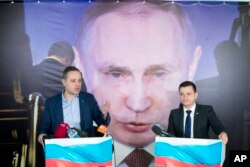The United States government is taking action against over 20 Russian “cyber actors” for interfering in the 2016 U.S. presidential election.
The Treasury Department announced sanctions against the GRU, the Russian military intelligence organization, and 13 Russian citizens. Those individuals already face charges as a result of a special U.S. investigation of Russian activities during the election campaign.
The measures also target the Internet Research Agency, a company based in Saint Petersburg, Russia. Officials say it sought to divide Americans with misleading stories and commentary on American issues during the campaign.
The sanctions mark the first time President Donald Trump’s administration has directly blamed the Russian government for election interference.
Putin riding ‘Russia First’ wave
Across Russia, final preparations are being made for elections on Sunday. Vladimir Putin is expected to win another term as president. Many Russians credit him with defending the country against Western governments that consider him a dangerous leader.
Studies of likely voters show Putin with a commanding election lead. That all but guarantees him another term that will take him to nearly 25 years in power.
The only thing that could take away from a Putin victory is if a lack of interest in a predictable election keeps many people from voting. The Reuters news agency says officials are also concerned that Putin’s opponents may organize protests against what they see as an undemocratic election.
In an election campaign where television reporters often say good things about Putin, he has presented himself as the only person who can defend Russia’s interests in a hostile world.
His supporters point to Russia’s military intervention in Syria and its takeover of Crimea from Ukraine in 2014 as examples of his leadership. They say U.S. and European sanctions announced during the Ukraine crisis are a price worth paying.
An argument with Britain over claims the Russian government poisoned a Russian double agent in England has not hurt Putin’s popularity. The Russian government has denied involvement.
Boycott Campaign
Vladimir Putin was first elected president in 2000. This year, on March 9, a study found that 69 percent of likely voters expressed support for Putin. The state-operated polling company reported the finding.
His nearest competitor, Pavel Grudinin, candidate of the Communist Party, received just 7 percent in the poll.
Another candidate, Ksenia Sobchak, a television presenter and family friend of Putin, has criticized the Russian leadership. But she has only two percent support, the same poll showed.
Government officials say some Russians may decide not to vote because of Putin’s lead over the other candidates. That could lessen his position with the ruling elite who have backed him, partly because of his ability to command popular support.
The first politician in years to threaten the government’s control on power, Alexei Navalny, is not on the ballot. He was barred after being jailed for corruption, charges he says were invented by Russian officials.
Navalny, who uses social media to fuel anger among his mostly young followers over official corruption, is pushing an election boycott.
“Our boycott campaign is working,” he said this week. As evidence, Navalny pointed to a plan by officials to offer food at lower than normal prices at voting stations. He also said state officials were pressuring government employees and students to vote.
Problems of the office
Though winning another term is nearly guaranteed, governing Russia for another six years will not be easy.
Hurt by lower oil prices and the effect of Western sanctions, Russia’s economy grew by only 1.5 percent last year. That is well below the growth Russians had come to expect in the earlier years of Putin’s rule.
Putin has spoken of the need to increase economic growth, but the steps that economists want include lessening the state’s position in the economy. Many people in leadership positions resist this idea because it may affect their own wealth.
But it is the end of Putin’s next term that may lead to problems. Term limits bar him from seeking re-election, and Putin has said he will not change the constitution to stay in office.
Some members of the ruling elite are reported to believe Putin will repeat the move he took in 2008 when he also faced term limits. At that time, another man took over the presidency while Putin served as prime minister.
If Putin, who will be 71 when his next term ends, wants to retire, however, he will need to identify a replacement. That risks releasing tensions between competing groups in the ruling elite.
I'm Bryan Lynn. And I'm Susan Shand.
Susan Shand adapted this report for VOA Learning English. Her story was based on information from VOANews.com and the Reuters news agency. George Grow was the editor.
_____________________________________________________________
Words in This Story
sanctions – n. a measure or action that results from failure to obey a law or rule
poll – n. an activity in which several people are asked a question or a series of questions in order to get information about what most people think about something
cyber – adj. of or related to or involving computers or computer systems
elite – n. upper class








